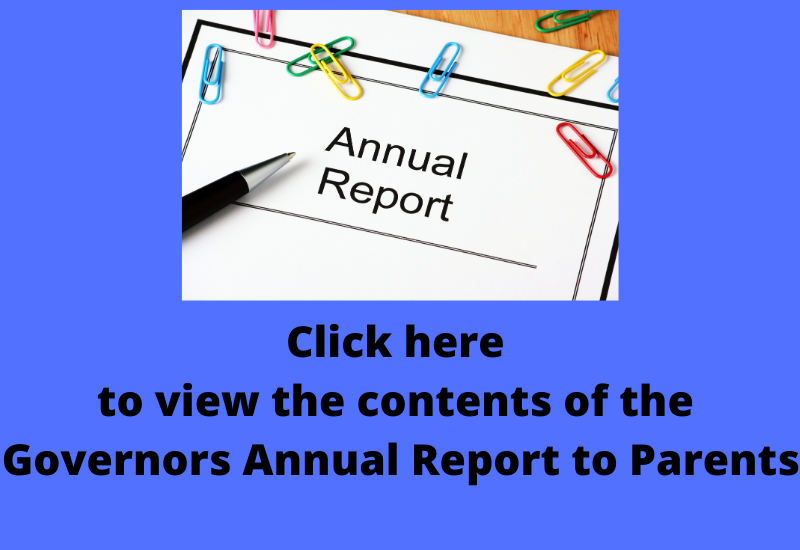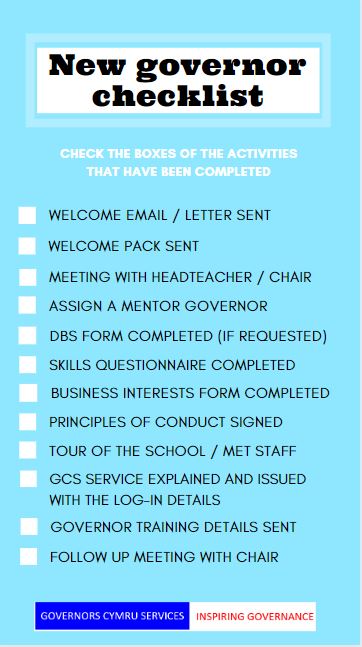
We would like to know your views on what you find rewarding about the governor role – email us so we can post comments in our becoming a governor section. Thanks
It’s that time of year when the Governors Annual Report to Parents is usually drafted and sent out. It is a statutory requirement to publish the report however, Welsh Government has again relaxed the reporting requirements for the academic year 2020 – 2021. You do not need to report on:
– School Performance
– Attendance
– Targets

It is important for a governing body to review its own effectiveness from time to time. This involves the governing body taking some time out from the normal governor business to explore what is working well and what areas of development are needed. A successful governing body will have embedded self -review practices into their annual work streams and they will have a clear action plan to help them improve. Self-evaluation doesn’t stop there though. The governing body needs to be fully involved in the school self-evaluation programme. Our toolkit is based around the key areas of Estyn’s inspection process. Each governing body can either work through the document systematically or target the section that are aligned to the school’s development plan. It really is up to you!
This video clip gives a flavour of how the e-toolkit works so all governors can be fully involved. Self-review exercises are essential for being truly effective and are the key to ensure school improvement. Do have a think about signing up.
Seeing how other governing bodies have used the self-review template is always a good way to determine the best way forward for your governing body. Here are two case studies that demonstrate the benefits of self-evaluation:
John Brown, Rainbow Federation, Cardiff – Strategies for improving the Governing Body
Allan Tait – Pontnewydd Primary, Torfaen
Do you have new governors on your governing body? We have a handy checklist to ensure that they receive everything they need in order to start their school governance journey.

The most successful education system…invest in developing their teachers as reflective, accomplished and enquiring professionals who have the capacity to engage fully with the complexities of education and to be key actors in shaping and leading educational change.
Donaldson, 2011
These FAQs offer governors some guidance on supporting teacher enquiry in schools. It also provides links to useful resources and links to examples of school/teacher enquiry.
What is teacher enquiry?
Teacher enquiry (also referred to as Action research, Close-to-practice research, Professional enquiry) can help schools and teachers to understand and improve their own practice. It can also allow schools and teachers to contribute to wider knowledge within the education community. Key features of ‘close to practice’ research include:
– Conducting inquiry that arises from – and is often identified during – educational practice.
– Using the insight and professional concerns of educational practitioners themselves (sometimes in partnership with research practitioners).
– Thinking critically about practice and the implications of the research / enquiry.
– Appling insights arising from the research or enquiry cycle back into practice.
Why is developing teacher enquiry important?
Educational research, in its many forms, has a key role to play in informing educational policy and practice. Education in Wales: Our National Mission (Welsh Government, 2018: 11) and the accompanying strategy The National Strategy for Educational Research and Enquiry (NSERE) …aim(s) to ensure Educational policy and practice is informed by the best research evidence and disciplined enquiry undertaken by educational professionals. Its objectives include … develop(ing) an evidence-based profession in Wales where leaders, teachers, support staff, local authority and regional consortia staff, HMI and other educational professionals use high-quality research evidence and are provided with opportunities to take part in professional enquiry.
What support do schools need to engage with teacher enquiry?
Schools will be in different positions and will have had varying levels of experiences when it comes to teacher enquiry. Effective support and guidance is key if schools and individual teachers within the school are to be successful in developing a meaningful and effective teacher enquiry community within their school. Schools should also be encouraged to contact their local LAs, consortia / regional partnerships, cluster schools or even HEIs for further guidance and support in developing enquiry within their school.
Where can I find examples of school/teacher enquiry projects?
The National professional Enquiry Project (NPEP) allows schools to access to a full list of school enquiries funded by the project. This includes useful summaries of past enquiry projects completed by schools. Some enquiries featured on the NPEP site will probably have been completed by schools within their locality and schools would benefit from discussing their experiences with neighbouring schools.
Questions to consider when conducting a teaching enquiry can include:
– What is your problem/area of interest?
– Can you capture your focus in a question?
– What does the literature tell you?
– Who is going to take part?
– When will you undertake your enquiry?
– Who will be involved in conducting the enquiry and collecting the data?
– What and how much data will you collect?
– What method(s) will you use to collect your data?
– Have you thought about research ethics?
Further resources related to teacher enquiry can also be found by following the links below:
– BERA (2018). Close-to-practice research project
– BERA ethical guidelines
– EEF research guides
– EWC practitioner research resources
– NFER ‘how to’ enquiry guides
Final thoughts
Teacher Enquiry (as with any research undertaken) has its challenges and there is inevitably a danger that schools, teachers and even governors will see enquiry as yet another tick box exercise that adds to ever increasing workloads i.e. specific time will initially need to be allocated to raising awareness of teacher enquiry and staff may also require specific training on conducting enquiry.
However, developing an enquiry community within your school also has several benefits as it allows you to effectively capture and support the innovative and creative ways in which teachers engage and encourage all learners. Using various methodologies also allows enquiry to consider all stakeholders perspectives, including the learners voice.
There is no expectation that teachers will adopt and become experts in enquiry overnight but ensuring that you begin to discuss enquiry in your school will not only aid the WG in achieving their eventual goal of creating and ‘Evidence Informed Profession’ but will also further enrich the experiences of all learners.
Dr Siân Lloyd-Williams
School Governor
Lecturer in Education and Director of Research, School of Education, Aberystwyth University
Aberystwyth University Lead on the National Professional Enquiry Programme led by Welsh Government
Member of Welsh Government working group looking at creating an ‘Evidence Informed Profession’ within the education sector.

In September 2020, Welsh Government launched Rights, respect, equality: statutory guidance to assist school governors, staff and relevant professionals working within a school environment in developing and implementing anti-bullying policies and strategies.
The Welsh Government is funding Kidscape to provide online training to governors and staff to make sure that all learners feel safe, secure and are supported to achieve their full potential.
The Rights, Respect, Equality School Support Webinar is available free of charge for governors and school staff in Wales who are leading on developing and updating the anti-bullying policy and strategy. All school leads who sign up for the webinar will be provided with an audit tool and action plan to help develop and update your anti-bullying policy and strategy over the next 3-12 months. The webinar will take you through the action plan step by step, with the opportunity for Q and A.
The webinars all takes place at 12.30pm – 2.30pm. The dates of the webinars are:
– 26th November 2021
– 10th December 2021 (Welsh medium)
– 28th January 2022
– 11th February 2022
– 25th March 2022
– 29th April 2022
– 20th May 2022 (Welsh medium)
– 24th June 2022
– 15th July 2022
To book your place, click here.
Important News from Qualifications Wales –
Our decisions report on our Right Choice for Wales consultation
Qualified for the future: The right choice for Wales. Analysis of consultation responses
Qualified for the future: The right choice for Wales. Consultation summary report
Qualified for the future: The right choice for Wales. Young people’s summary of findings and decisions report
Estyn thematic report – The teaching of Welsh history including Black, Asian and Minority Ethnic history, identity and culture
Welsh Government -School attendance (coronavirus): guidance for schools
Welsh Government – Children and young people with higher clinical risk and clinically extremely vulnerable adults: guidance for education settings
Welsh Government -School operations: coronavirus (updated 12 October 2021)
The Keeping safe online area of Hwb has been refreshed to help you find up-to-date online safety, cyber security and data protection guidance, resources and events. Click here to take a look.
Education Workforce Council – National Education Workforce Survey report 2021. Out now and worth having a read.
01443 844532 / 029 2075 3685
[email protected]
Sam MacNamara – 07943 887275 / Jane Morris – 07957 969708